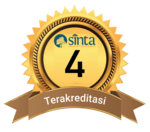KEEFEKTIFAN PENGGUNAAN MEDIA VLOG (VIDEO BLOGGING) DALAM KETERAMPILAN MENULIS TEKS NARASI SISWA KELAS VII SMP NEGERI 2 GAMPING TAHUN AJARAN 2018/2019
DOI:
https://doi.org/10.31316/skripta.v5i1.123Abstract
Abstrak: Penelitian ini bertujuan untuk mengetahui apakah media Vlog lebih efektif terhadap keterampilan menulis teks narasi siswa kelas VII SMP Negeri 2 Gamping. Penelitian ini dilakukan di SMP Negeri 2 Gamping. Jenis penelitian ini adalah eksperimen semu dengan desain The Nonequivalent Post-Test-Only Control Group Design. Kelas eksperimen menggunakan media vlog dan kelas kontrol menggunakan model pembelajaran langsung. Populasi penelitian ini adalah seluruh kelas VII SMP Negeri 2 Gamping. Sampel penelitian ini adalah siswa kelas VII C sebagai kelas eksperimen dan kelas VII E sebagai kelas Kontrol. Instrumen yang digunakan dalam penelitian ini adalah tes uraian yang telah diuji cobakan dan lembar observasi. Dari hasil uji coba instrumen tes uraian dinyatakan valid dan reliabel. Teknik analisis data yang digunakan adalah Uji t dengan taraf signifikan =0,05. Pengaruh penerapan media vlog telah diterapkan dengan baik, sesuai dengan prosedur yang benar, siswa juga menunjukan perubahan perilaku sesuai dengan indikator yang diharapkan. Setelah diterapkan media vlog siswa lebih mudah memahami pembelajaran menulis teks narasi dibandingkan dengan pembelajaran secara langsung tanpa menggunakan media vlog. Hal ini ditunjukan dengan hasil uji-t 6,661dengan db 58 dan P sebesar 0,000. Hasil penelitian terbukti bahwa media vlog lebih efektif terhadap keterampilan menulis teks narasi siswa kelas VII SMP Negeri 2 Gamping. Hal ini ditunjukan dengan hasil nilai rata-rata di kelas eksperimen sebesar 80,73 dan nilai persentase di kelas kontrol sebesar 60,03.
Â
Kata Kunci: Keefektifan, Vlog, Menulis Teks Narasi
Â
Abstract: The aim of this study to find out whether the media Vlog is more effective against narrative text writing skills seventh grade students of State Middle School 2 Gamping. This research was conducted in Gamping 2 Public Middle School. Type this research is an experiment pseudo with the design Nonequivalent Post-Test-Only Control Group Design. Class experiment using media vlog and control class using a learning model directly. The population of this study are all VII grade middle school students Country 2 Gamping. Sample this research is class students VII C as an experimental class and class VII E as the Control class. Instruments used in this research is a description of the tested and sheet observe From the results of the trial description stated instruments they are valid valid. Analysis technique the data used is the t test with a significance level = 0.05. Effect of media application vlog has been implemented well, according to the correct procedure, students also show change behavior according to the indicator which are expected. After applied more vlog media to students easy to understand learning narrative text writing compared with learning directly without using vlog media. This is shown with the t-test results of 6.661 with db 58 and P of 0,000 The results of the study are proven that vlog media is more effective towards text writing skills narrative of VII grade students of State Middle School 2 Gamping. This is shown with the results of the average value in the class experiment at 80.73 and value the percentage in the control class is equal to 60.03.
Â
Keywords: Effectiveness, Vlogs, Writing Narrative Text
Downloads
Published
How to Cite
Issue
Section
License
- Authors retain copyright and grant the journal right of first publication with the work simultaneously licensed under a Creative Commons Attribution License that allows others to share the work with an acknowledgment of the work’s authorship and initial publication in this journal.
- Authors are able to enter into separate, additional contractual arrangements for the non-exclusive distribution of the journal’s published version of the work (e.g., post it to an institutional repository or publish it in a book), with an acknowledgment of its initial publication in this journal.
- Authors are permitted and encouraged to post their work online (e.g., in institutional repositories or on their website) prior to and during the submission process, as it can lead to productive exchanges, as well as earlier and greater citation of published work.





